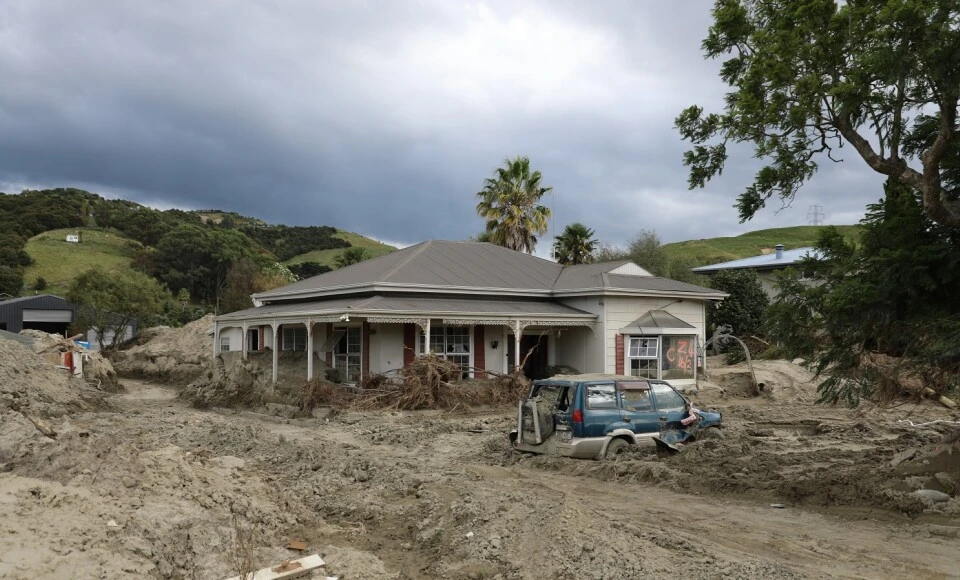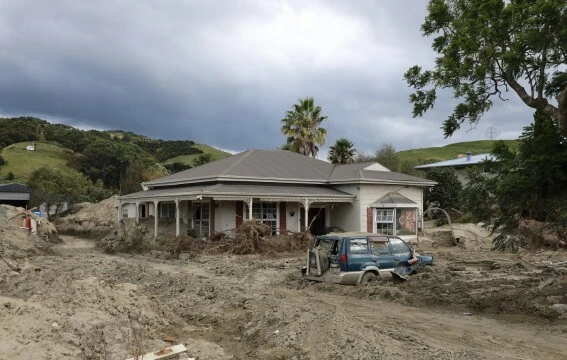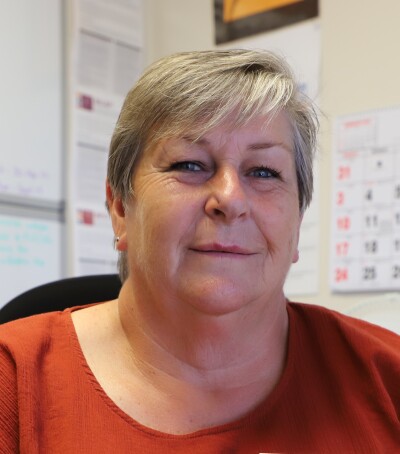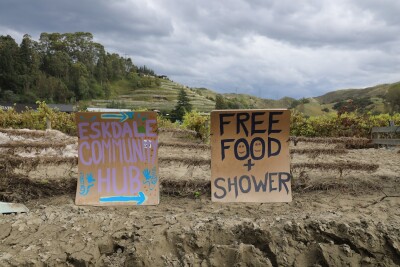Giving hope in cyclone-torn Hawke’s Bay communities
17 August 2023


Six months on from Cyclone Gabrielle, regional project manager Carol Ball reflects on her time working alongside the ‘phenomenal’ Hawke’s Bay community.
It was eight weeks after Cyclone Gabrielle that Carol Ball first saw in person the damage in Hawke’s Bay, and she says it looked as if it had happened yesterday. “When we drove through the little town of Pakowhai, that was where were we first saw the devastation, it was two months on but there were still huge piles of silt and debris along the road, damaged vehicles scattered around, houses that were still full of silt, it was pretty confronting.”
Boots ‘n’ all

Carol Ball, former regional project manager for the New Zealand Disaster Fund in Hawke's Bay
Carol’s been with New Zealand Red Cross for 33 years in a range of roles, and had already been supporting the cyclone response from her home in Christchurch. A new project manager was needed in Hawke’s Bay and Carol didn’t hesitate to put her hand up. She says from the moment she arrived in the region she was “in there boots ‘n’ all.”
The first thing she did was buy a map of the district. Then she called a meeting of community representatives to piece together what was already happening and what needed doing. Twenty people showed up. “Together we sorted out who was doing what and made a list of connections. It was really useful because they then decided to make the meeting a regular thing — because while people were in touch with each other within their own communities they weren’t well-connected across communities.”
Then Carol hit the road — delivering clean-up kits and power generators, attending community meetings, and liaising with local support agencies to coordinate the response. By then New Zealand Red Cross had set up a grants programme through its New Zealand Disaster Fund, so Carol began to visit community organisations to support them with their grant applications. She says the Hawke’s Bay community have been phenomenal in the way they have mobilised to support each other and they have been proactive about finding funding — eventually receiving more than $7 million in grants from the Fund.
One of the ways New Zealand Red Cross helped was by hiring caravans as temporary homes for people in Esk Valley. Carol says some of the highlights at this time were the little things. “Winter was coming and the caravans had no heating, so we delivered oil heaters to them. Small things can make a big difference.”
The painstaking clean-up
The amount of silt choking many areas in Hawke’s Bay was quite shocking Carol says. “I was taken to a house in Esk Valley buried in silt and I literally had to crawl on my hands and knees through the top half of a window to get inside. Then there was as much silt inside as there was outside – it would have been a good two metres deep.”
Carol says houses like that are not salvageable, and many of those that are, have yet to be cleaned up.
Many people just haven’t been able to get to their homes, and some are still waiting to find out if they will be allowed back. Others are waiting for the big machinery needed to clear silt to become available so they can get to their homes.
And sadly, she says some people just don’t want to go home. “Some of them ask for mementos to be saved and returned if they are found, but they never want to go back there.”
Through the New Zealand Disaster Fund, New Zealand Red Cross has been able to provide significant financial support across the Hawke’s Bay to support clean-up efforts.
In additional to this support, her Hawke’s Bay-based Red Cross team have distributed hundreds of clean-up kits with shovels, brooms, gloves, overalls, tarps and sometimes water blasters and wet and dry vacuums. “Clean-up was and is still a huge job. This was something practical we could do to make it a little easier.”
The value of knowing your neighbours

Eskdale community signs directing people to assistance.
One thing that struck Carol very quickly was that communities that had been well connected before the cyclone, were able to rally together quickly and set up their own community hubs and look out for each other. But those that were not as well connected took a lot longer to be able to figure out what was needed and plan a way forward. “Communities that had strong family connections, like many of the Māori communities, and also those that had a school and a pub, which are often the main connection points in rural communities — they were able to get straight into the work of supporting each other.”
Just listening
Carol says hearing people talk about their experience is vastly different to reading it in a paper. “The emotion is right there. The best thing we can do is listen – they want people to know their story and what they went through.” She says it’s a bit like men coming back from war – some talk about it, some don’t. “Those that talk about it heal inside more quickly, so if someone wants to tell you their story, the best thing you can do is listen.”
In Esk Valley, where many properties were flooded and tragically two people lost their lives, locals have started up what they call the ‘Friday Reviver’ – where a small team load their vehicle up with clothing, blankets, groceries and fresh baking to visit the elderly in their community and others who are isolated in their homes. The team is joined by someone from New Zealand Red Cross who has been trained to give psychological support. “People are just so glad to see them. They’re grateful for the supplies but some really just want to talk about what’s happened to them and how they’re faring.” It takes time to listen. In the first Friday Reviver they hoped to get around all the homes “But at the end of that long day they had managed just a few. But it’s so valuable for people – just the opportunity to talk.”
While Carol’s witnessed some incredible resourcefulness, there are some stories that keep her awake at night. A man told her about the night the flood came – his family had their grab-bags ready, but quite suddenly the water smashed into their house from an unexpected direction. “He and his wife pulled their two young daughters up onto the kitchen bench, but the water rose and they had to move up onto the cupboards.” Carol says. “He then had to break into the ceiling cavity and haul the family up – they stayed there all night.” The man told her he didn’t want to look back into the hole because he could hear furniture bumping on the ceiling. “They just lived through possibly the most horrific event they will ever experience – my heart went out to those wee girls – I worry about their recovery, but kids can be amazing so I hope they will be OK.”
Road to healing
And Carol is witnessing people recover. Last week she attended a community event for people that had been displaced from their homes that had been supported by a New Zealand Red Cross grant. “There was a great atmosphere — people were laughing and sharing stories, it was lovely just to see the joy of everyone being together again.”
Carol says wherever she and her team go they are welcomed with a smile. Sometimes they visit homes in remote parts of the Bay and find the family hasn’t seen any other organisation at all, where New Zealand Red Cross is the first to show up, and she says this is still happening. “We’ve been received absolutely fantastically. People are really grateful simply because we took the time to go and check in on them and show support.”
She says the connections she and the team have made will help ensure a stronger community response next time there is a disaster.
“We’ve given hope and supported a lot of people and communities – but there’s still an awful lot to do. But just knowing that Red Cross is there supporting as many communities as possible is enough, and if we can’t help them directly we can refer them to where they can get help so there’s value in us just sharing that knowledge.”
Learn more
We’ve been around for more than 100 years. As the impacts of climate change increase the frequency and severity of weather-related emergencies across the country, we’ll keep being here.
The New Zealand Disaster Fund helps us to support communities to respond to, recover from, and prepare for disasters and emergencies in Aotearoa New Zealand.
If you want to stay up-to-date on how the New Zealand Disaster Fund is making a difference you can register for email updates.
Sign up for regular updates about the New Zealand Disaster Fund (redcross.org.nz)
Practical support and information to help you care for yourself and others after the recent flooding and Cyclone Gabrielle.
Caring for yourself and others after an emergency or disaster
Volunteer with us
We can’t do our work without the thousands of Kiwis from all corners of Aotearoa New Zealand who give their time and energy to volunteer.
We’re always on the lookout for dedicated people to join us in our humanitarian work. Join over 8,000 other humanitarians in New Zealand and volunteer today.
Find a volunteer role near you
Red Cross in your community
New Zealand Red Cross is part of your community. We have 16 offices around New Zealand including our head office in Wellington. You can join your local branch, group in over 40 cities and towns around New Zealand, or shop at one of our 50 retail stores.
New Zealand Red Cross has 15 ‘areas’ across the country. Each area has its own area council, which is elected by the local Red Cross members.
There are nearly 50 branches of New Zealand Red Cross around the country. Branches have a hands-on local-community focus, and are run by volunteers.
